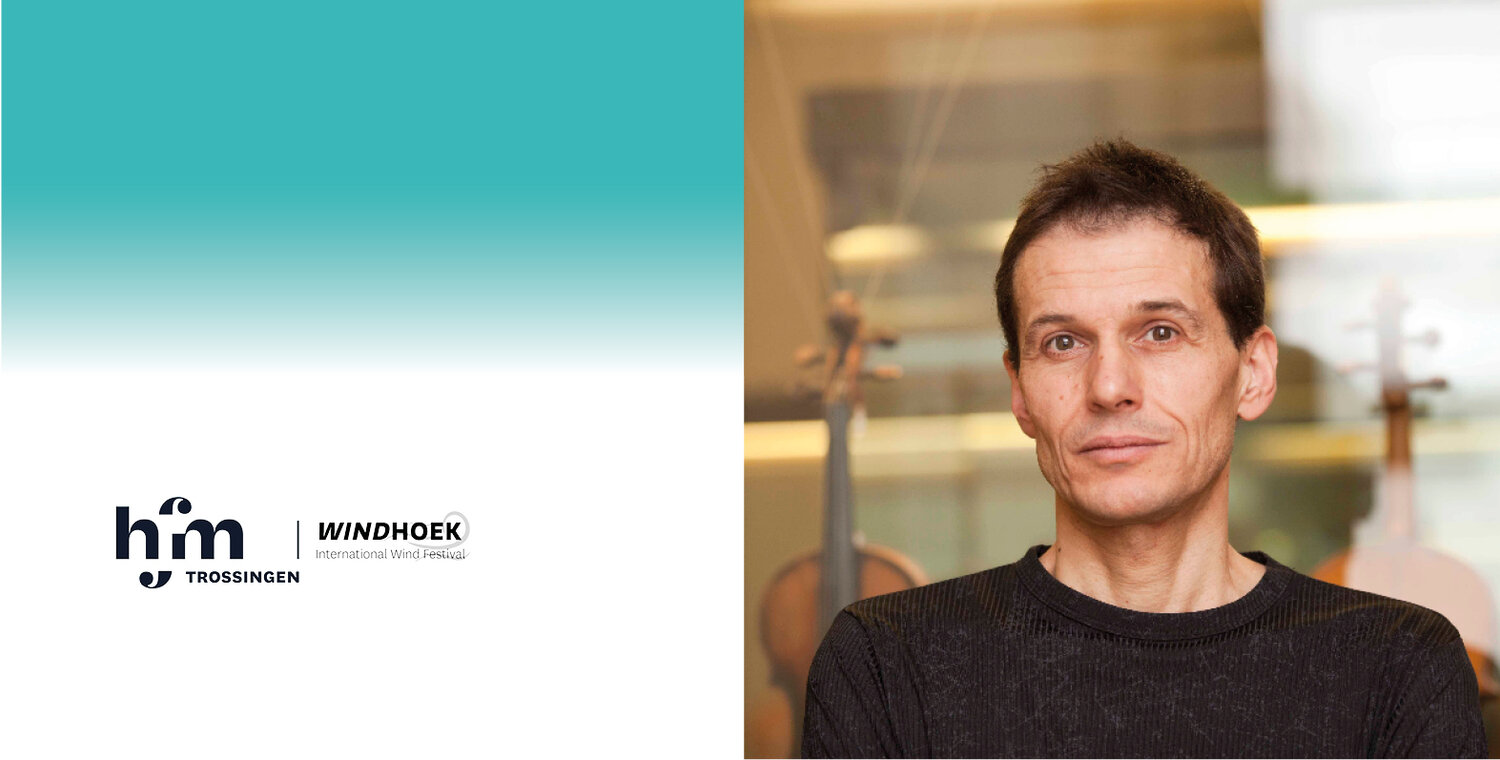
Marco Stroppa
Professor of Composition @ HMDK Stuttgart
- Participation at the Festival with students of his class
- Workshop and Concert on April 1st, 2023 with Compositions of his Class
The composer, researcher, and teacher Marco Stroppa (born in Verona, Italy on December 8th, 1959) began his musical studies in Italy (degree in Piano, Composition, Choir Conducting, and Electronic Music). He perfected his scientific knowledge at the Massachusetts Institute of Technology in the USA between 1984-1986 (Cognitive Psychology, Information Technology, and Artificial Intelligence).
From 1980 to 1984 he worked with the Computer Sounds Research Center in Padua. At the invitation of Pierre Boulez, he moved to Paris in 1982 in order to work as a composer and researcher at IRCAM. From 1987 to 1990 he was named director of the Musical Research department at IRCAM. The collaboration has continued without interruption to this day and was of crucial importance to his musical training.
In 1996 he received the Composition Prize of the Osterfestspiele in Salzburg. That summer, he was among the Next Generation composers at the Salzburg Festival.
Marco Stroppa has been an active lecturer at IRCAM since 1984. In 1987 he established the Composition and Computer Music course at the International Bartok Festival in Szombathely, Hungary, where he taught until 1999. He has been Professor of Composition at the University of Music and Performing Arts in Stuttgart since 1999. He also taught at the Conservatoire National Supérieur in Paris and Lyon.
Among his most important works are Traiettoria (1982-84) for piano and electronics, Spirali (1988-89) for string quartet with room projection, Hiranyaloka (1993-4) for orchestra, élet...fogytiglan (1989-98) for ensemble, 1. Buch (1991-95) for piano, Zwielicht (1998) for two percussionists, double bass, electronics, and 13-D room projection, Come Natura di Foglia (1996-2001) for vocal ensemble and electronics, as well as for different rows (Auras, 1995, for percussion, little i, 1996, for Flute, I will not kiss your f.ing flag, 2005, for trombone, ...of Silence, 2007, for saxophone, hist whist, 2009, for violin), Concertos (Upon a Blade of Grass, 1996, for piano and large orchestra and From Needle's Eye, 1999, for trombone, 2 quintets and percussion), choral works (Cantilena, 2001, for 16-voiced 3-part divided and mixed choir, Lamento, 2004, for 6-voiced mixed choir), und chamber music works (Hommage à Gy. K., 2003, for clarinet, viola, and piano, Nous sommes l’air, par la terre, 2003, for viola and accordion, Ossia, Seven Strophes for a Literary Drone, 2005, for violin, cello and piano, Opus nainileven, Cinque Requies per la Democrazia, 2004, for wind quintet, gla-dya, études sur les rayonnements jumeaux, for 2 horns.
Currently in progress: And one by one we drop away, for cello and 3 orchestra groups, Like Milk Spilt, for Accordion, 2 shadow accordions and orchestra as well as a project for musical theater with a libretto by Arrigo Boito (Re Orso) for Opéra Comique, Paris, and La Monnaie, Brussels.

Marco Stroppa
Professor für Komposition @HMDK Stuttgart
- Teilnahme am Festival mit Studierenden seiner Klasse
- Workshop und Konzert am 01. April 2023 mit Kompositionen seiner Klasse
Der Komponist, Forscher und Dozent Marco Stroppa (geb. 8.12.1959 in Verona) begann seine Musikstudien in Italien (Diplom in Klavier, Komposition, Chorleitung und Elektronische Musik). Er perfektionierte in der Zeit von 1984 bis 1986 seine wissenschaftlichen Kenntnisse am Massachusetts Institute of Technology in den USA (Kognitive Psychologie, Informatik und Künstliche Intelligenz).
Von 1980 bis 1984 arbeitete er mit dem Computerklangforschungszentrum der Universität Padua zusammen. Auf Einladung von Pierre Boulez hin, zog er 1982 nach Paris um als Komponist und Forscher am IRCAM zu arbeiten. Von 1987 bis 1990 wurde er auch Direktor der Abteilung für musikalische Forschung des IRCAMs ernannt. Diese Zusammenarbeit setzte sich ohne Unterbrechung bis heute fort und war von entschiedener Bedeutung für seine musikalische Ausbildung.
1996 erhielt er den Kompositionspreis der Osterfestspiele in Salzburg. Im Sommer des gleichen Jahres war er unter den Komponisten der Next Generation bei den Salzburger Festspielen.
Als aktiver Dozent erteilt Marco Stroppa seit 1984 am IRCAM Unterricht. 1987 gründet er den Kompositions- und Computermusikkurs beim Internationalen Bartók Festival in Szombathely (Ungarn), wo er bis 1999 unterrichtete. Seit 1999 ist er Professor für Komposition an der Hochschule für Musik und Darstellende Kunst Stuttgart. Er unterrichtete auch an dem Conservatoire National Supérieur in Paris und Lyon.
Unter den wichtigsten Werken zählen: Traiettoria (1982-84) für Klavier und Elektronik, Spirali (1988-89) für Streichquartett mit Raumprojektion, Hiranyaloka (1993-4) für Orchester, élet...fogytiglan (1989-98) für Ensemble, 1. Buch (1991-95) für Klavier, Zwielicht (1998) für 2 Schlagzeuger, Kontrabass, Elektronik und 13-D Raumprojektion, Come Natura di Foglia (1996-2001) für Vokalensemble und Elektronik sowie verschiedene Reihen (Auras, 1995, für Schlagzeug, little i, 1996, für Flôte, I will not kiss your f.ing flag, 2005, für Posaune, ...of Silence, 2007, für Saxofon, hist whist, 2009, für Violine), Concertos (Upon a Blade of Grass, 1996, für Klavier und großes Orchester und From Needle's Eye, 1999, für Posaune, 2 Quintette und Schlagzeug), Chorwerke (Cantilena, 2001, für 16-stimmingen 3-fach geteilten gemischten Chor, Lamento, 2004, für 6-stimmigen gemischten Chor) und kammermusikalische Werke (Hommage à Gy. K., 2003, für Klarinette, Bratsche und Klavier, Nous sommes l’air, par la terre, 2003, für Bratsche und Akkordeon, Ossia, Seven Strophes for a Literary Drone, 2005, für Violine, Cello und Klavier, Opus nainileven, Cinque Requies per la Democrazia, 2004, für Bläserquintett, gla-dya, études sur les rayonnements jumeaux, für 2 Hörner.
In Vorbereitung: And one by one we drop away, für Cello und 3 Orchestergruppen, Like Milk Spilt, für Akkordeon, 2 Schattenakkordeons und Orchester sowie ein Projekt für das Musiktheater über ein Libretto von Arrigo Boito (Re Orso) für Opéra Comique, Paris, und La Monnaie, Brussel.